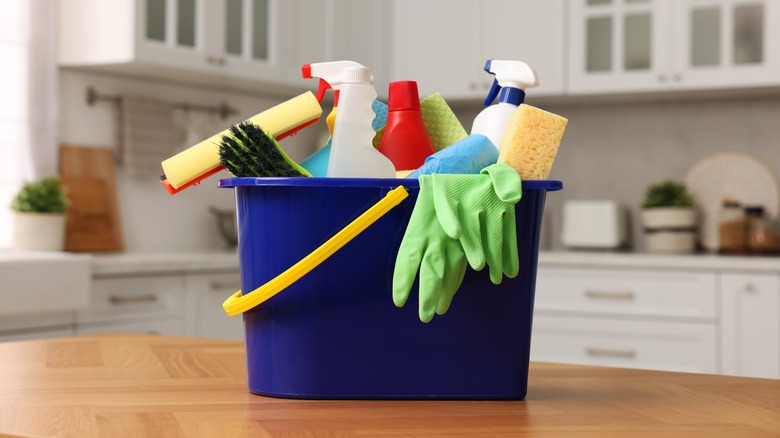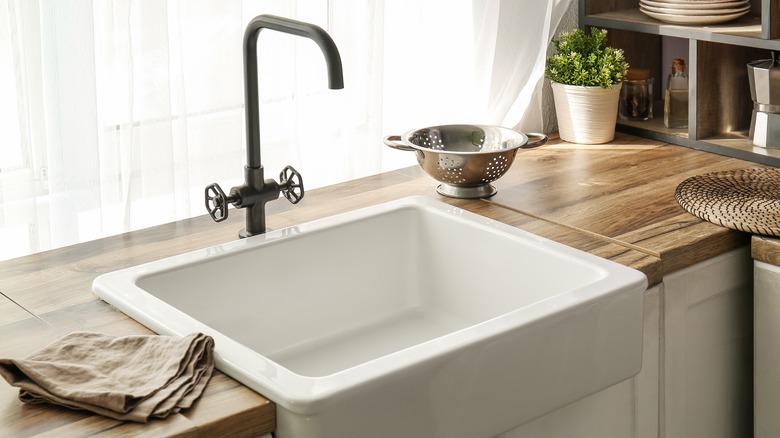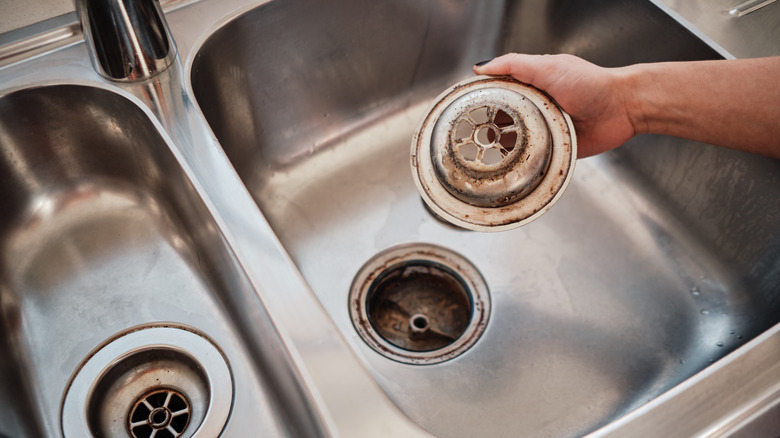This Is The Dirtiest Spot In Your Kitchen That You Should Be Cleaning Daily
There are certain rooms in your home that seem to always need your attention, and the kitchen is an obvious one. From dirty dishes to cluttered countertops to sticky floors, the work can feel never-ending. However, there is one spot that tends to get overlooked despite accumulating the most germs — your kitchen sink. It may seem like the amount of soap that gets washed down the drain might be sufficient to keep your sink clean, but this area can become a breeding ground for harmful bacteria if it isn't properly disinfected. This is why you should not only deep clean your kitchen regularly, but also tend to your sink on a daily basis.
Your kitchen sink is more contaminated than your bathroom toilet. Just think about that for a minute before you start rinsing off those delicious-looking strawberries or summer tomatoes. If you're wondering how it's possible, consider how the sink is one of the most frequently used spots in your home, making it constantly exposed to a wide range of bacteria every time you wash dishes or dispose of food scraps. It's also not much of a secret that bacteria thrive in wet environments, so there's no more hospitable place in the kitchen for them to feel welcome. And once they've arrived, they have the perfect conditions to multiply. This is why it's crucial to clean your sink daily to prevent the spread of bacteria.
The major concerns of a dirty sink
Your kitchen is arguably the most important room in your house, and there are major safety concerns when it comes to any area that food is prepped and served in. Research by NSF International revealed that the kitchen sink is one spot that's likely to harbor dangerous bacteria such as Salmonella and E. coli. While this may seem fine contained to a place like the sink — somewhere you don't cook food or eat from — there is a very real possibility of cross-contamination. These dangerous pathogens can easily transfer to food, utensils, cutting boards, or your hands, and spread to other areas of the kitchen. This can put you and your loved ones at risk of foodborne illnesses.
Even when your sink looks clean after rinsing, germs can still be lingering, especially around the faucet handles, sink edges, and drain — which can actually be the most problematic area since almost everything ends up there eventually. Anything that is washed down the sink, including scraps and grease, can also clog the drain, creating buildup in the pipes. Leftover food scraps may decompose, creating even more bacteria and unpleasant odors. By cleaning your sink daily, you can prevent these issues and ensure your kitchen stays safe and sanitary for food preparation.
How to clean your sink daily
There are plenty of mistakes everyone makes with their kitchen sink, and not cleaning it enough is definitely one of them. While it might seem excessive, the best way to prevent the buildup of residue and bacteria is to take on a daily cleaning practice. Simply combine a few household ingredients to disinfect and freshen up your sink in a few minutes. At least once a day, remove all dishes and food debris from your sink and run some hot water to rinse out the basin and loosen up any residue. Then sprinkle a generous amount of baking soda over the entirety of the basin to act as a gentle scrubber that won't scratch your sink.
Take a soft sponge or cloth and scrub the sink, faucet, and drain, focusing on the areas that typically accumulate soap scum and food particles since they are more likely to host bacterial growth. Pour white vinegar into the sink over the baking soda for that satisfying fizzy sound. Let the mixture sit for a few minutes, then take your sponge to it again before rinsing thoroughly with some hot water. For thorough disinfecting, follow up with bleach or a commercial sanitizer and rinse thoroughly again. The last step is to dry everything off with a clean cloth. Then try to get in the habit of wiping down your sink with a cloth after each use to help keep it dry. Remember, moisture is what helped get you into this mess in the first place.


